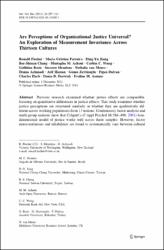Are Perceptions of Organizational Justice Universal? An Exploration of Measurement Invariance Across Thirteen Cultures

View/
Access
info:eu-repo/semantics/closedAccessDate
2011Author
Fischer, RonaldFerreira, Maria Cristina
Jiang, Ding-Yu
Cheng, Bor-Shiuan
Achoui, Mustapha M.
Wong, Corbin C.
Assmar, Eveline M.
Metadata
Show full item recordAbstract
Previous research examined whether justice effects are comparable, focusing on quantitative differences in justice effects. This study examines whether justice perceptions are structured similarly or whether they are qualitatively different across working populations from 13 nations. Confirmatory factor analysis and multi-group analysis show that Colquitt's (J Appl Psychol 86:386-400, 2001) four-dimensional model of justice works well across these samples. However, factor intercorrelations and reliabilities are found to systematically vary between cultural samples. Perceptions of justice are more highly intercorrelated in power distant and collectivistic samples, in line with extensions of the relational model of authority. Score reliabilities were lower in collectivistic settings.

















